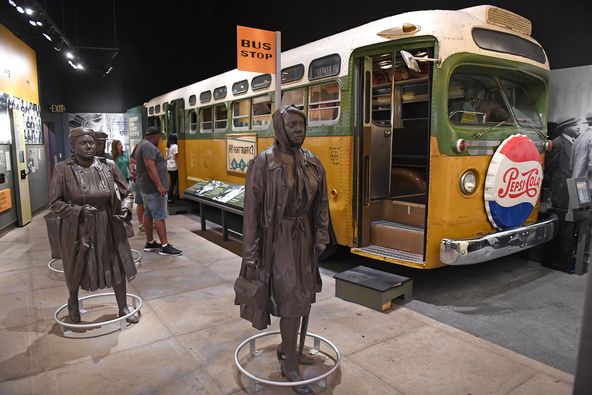AUTOMOTIVE HISTORY – DECEMBER 7, 1955 – The Montgomery Bus Boycott The Montgomery Bus Boycott was a civil rights protest during which African Americans refused to ride city buses in Montgomery, Alabama, to protest segregated seating. The boycott took place from December 5, 1955, to December 20, 1956, and is regarded as the first large-scale U.S. demonstration against segregation.Four days before the boycott began, Rosa Parks, an African American woman, was arrested and fined for refusing to yield her bus seat to a white man. The U.S. Supreme Court ultimately ordered Montgomery to integrate its bus system, and one of the leaders of the boycott, a young pastor named Martin Luther King, Jr., emerged as a prominent leader of the American civil rights movement.In 1955, African Americans were still required by a Montgomery, Alabama, city ordinance to sit in the back half of city buses and to yield their seats to white riders if the front half of the bus, reserved for whites, was full.But on December 1, 1955, African American seamstress Rosa Parks was commuting home on Montgomery’s Cleveland Avenue bus from her job at a local department store. She was seated in the front row of the “colored section.”When the white seats filled, the driver, J. Fred Blake, asked Parks and three others to vacate their seats. The other Black riders complied, but Parks refused.She was arrested and fined $10, plus $4 in court fees. This was not Parks’ first encounter with Blake. In 1943, she had paid her fare at the front of a bus he was driving, then exited so she could re-enter through the back door, as required. Blake pulled away before she could re-board the bus.Did you know? Nine months before Rosa Parks’ arrest for refusing to give up her bus seat, 15-year-old Claudette Colvin was arrested in Montgomery for the same act. The city’s Black leaders prepared to protest until it was discovered Colvin was pregnant and deemed an inappropriate symbol for their cause.Although Parks has sometimes been depicted as a woman with no history of civil rights activism at the time of her arrest, she and her husband Raymond were, in fact, active in the local chapter of the National Association for the Advancement of Colored People (NAACP), and Parks served as its secretary.Upon her arrest, Parks called E.D. Nixon, a prominent Black leader, who bailed her out of jail and determined she would be an upstanding and sympathetic plaintiff in a legal challenge of the segregation ordinance. African American leaders decided to attack the ordinance using other tactics as well.The Women’s Political Council (WPC), a group of Black women working for civil rights, began circulating flyers calling for a boycott of the bus system on December 5, the day Parks would be tried in municipal court. The boycott was organized by WPC President Jo Ann Robinson.As news of the boycott spread, African American leaders across Montgomery (Alabama’s capital city) began lending their support. Black ministers announced the boycott in church on Sunday, December 4, and the Montgomery Advertiser, a general-interest newspaper, published a front-page article on the planned action.Approximately 40,000 Black bus riders—the majority of the city’s bus riders—boycotted the system the next day, December 5. That afternoon, Black leaders met to form the Montgomery Improvement Association (MIA). The group elected Martin Luther King, Jr., the 26-year-old-pastor of Montgomery’s Dexter Avenue Baptist Church, as its president, and decided to continue the boycott until the city met its demands.Initially, the demands did not include changing the segregation laws; rather, the group demanded courtesy, the hiring of Black drivers, and a first-come, first-seated policy, with whites entering and filling seats from the front and African Americans from the rear.

